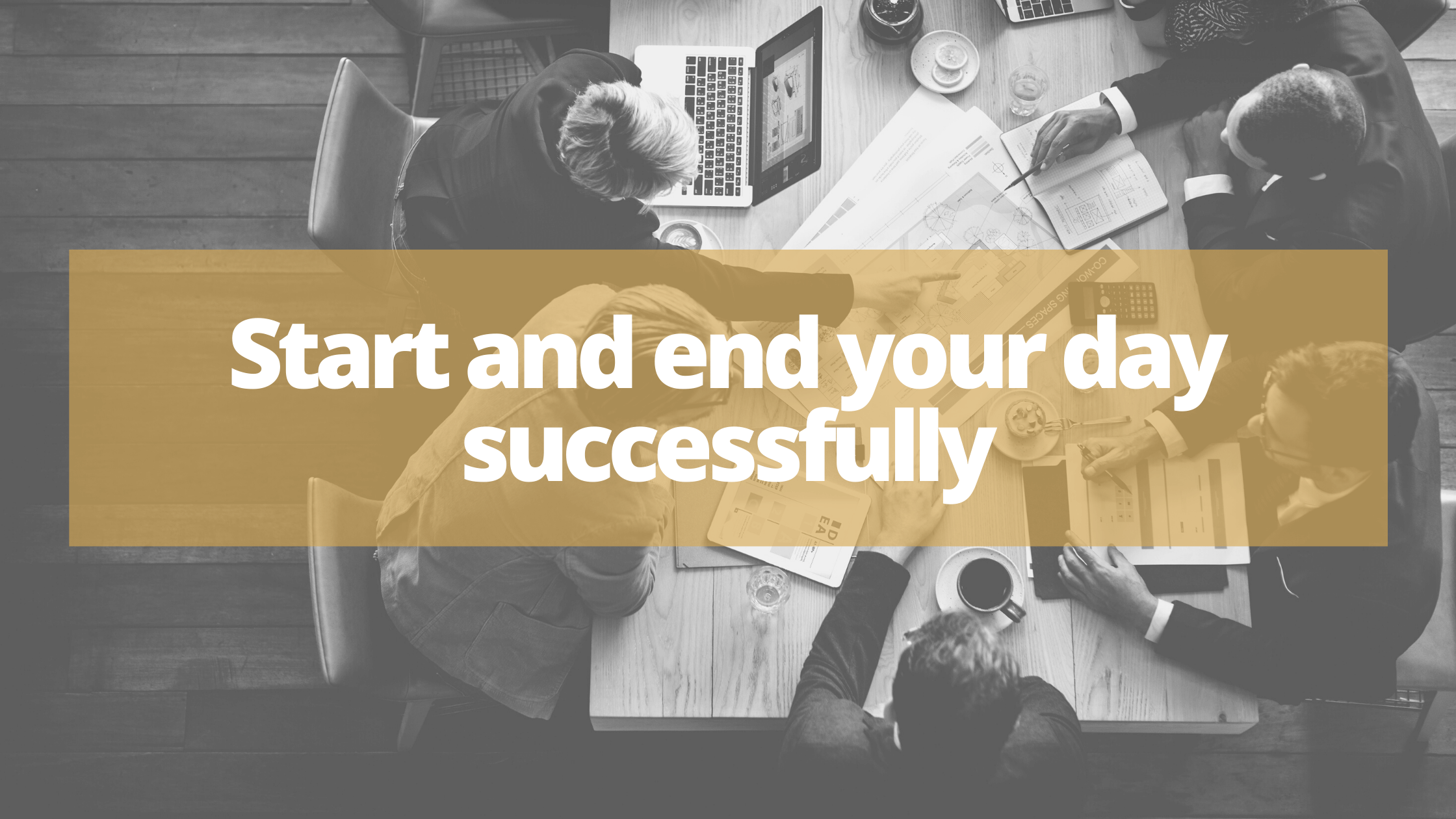
Start and end your day successfully
Have you ever had a day that started badly and ended the same way?
Nothing seemed to go right, and you felt like you were playing catch-up?
It only takes 10 minutes to set the tone for the day, so it is important to start the day successfully.
START OF THE DAY
Greet your colleagues!
I cannot stress enough the importance of greeting your colleagues. Sure, you see them every day, but a simple hello lets them know they are
seen and valued. Having a pleasant exchange with a colleague can also boost your mood and help you connect. Don’t ignore the power of a
smile.
Don’t start with emails
You open your emails and immediately see an inbox full of demands for your time. Instead of starting the day proactively, you fall into a
reactive mindset and before you know it, an hour has past and you haven’t accomplished anything. I’m not suggesting you ignore your emails
altogether, but first thing in the morning is not the best approach.
Find your calm
Sit at your desk and focus on your attitude. Whether you take a minute to meditate or perform mindfulness, read an inspirational quote or
even reflect on the previous day's successes, find something that gets you in the right frame of mind. Don’t let the day defeat you before
it’s even started. Thinking optimistically and being excited about your work will help define your chances of accomplishment.
Plan your day
Whether you use a list, an app, computer program, whiteboard or write it down on a piece of paper, plan your day. What do you want to
accomplish? What are the priorities? Creating a list can also put things in perspective and give you focus. Remember to keep your goals
achievable. Don’t set yourself up for failure by overcommitting yourself. If your list is too long and you feel overwhelmed, pick three
things to focus your attention and work on small goals.
Embrace your productive style
Do you have big decisions to make or a task that requires your full attention? Some people work better in the morning, while others are
more productive towards the end of the day. Find the time of day that works for you and make the most of your productive style. Imagine if
you were not a morning person and you started your day on something that required your full attention. Would your results be productive and
would you have a good outcome? Simply being aware of your productivity style can lead to less stress and better results.
END OF THE DAY
Reflect!
Look at your plan, what did you accomplish, what still needs your attention? Acknowledge where you have done your best and review areas that
could be improved. This is the time to be real with yourself. Self-analysis leads to self-improvement. Don’t be afraid to pat yourself on
the back.
Visualise your next day
Having something fresh in your mind now doesn’t mean you will remember the next day. What do you need to complete? Consider taking down a
few notes or adding time in your calendar to set aside for specific tasks.
Check your calendar
Do you have any early appointments? Do you have everything you need for your meetings? Are you required at a different location? Checking
your calendar will ensure you know what is expected of you. Starting the day running behind leaves you no time to catch-up, so make sure you
plan.
Organise your workspace
The last thing you want to do when you start work is to sit down to a messy workstation. Starting the day knowing where everything is, can
save time the next day. It’s not just about having a fresh clean desk, you need to be compliant with the organisation's confidentiality
policies. Simply leaving clients documents, or work on the desk for anyone to see could lead to a breach of confidentiality.
Show appreciation
Who doesn’t like to be thanked for a job well done? Did someone do something worth mentioning? Being appreciative doesn’t have to be over
the top, a simple thank you is enough to convey that their help was beneficial.
Say goodbye
Yes, this is just as important as saying hello in the morning. A simply goodbye can foster strong working relationships and help you
debrief. It also lets people know you have left the building. This is going to sound strange, but say goodbye and leave. You may be
finished, however, others may still have more to accomplish. Standing by their desk for a chat takes them away from getting done what they
need to do and shows you don’t value their time.
The Money Edge | Kerri Schulz

.png)
.png)
.png)